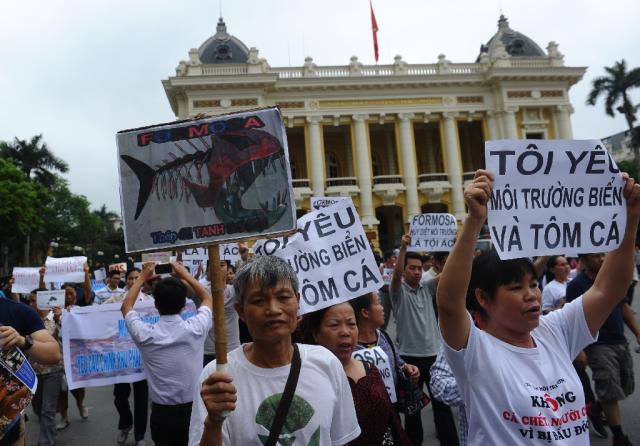
Hundreds of people gathered Sunday in the Vietnamese capital to protest against a Taiwanese company suspected of involvement in a toxic leak that has hit the fishing industry along the central coast.
Tonnes of dead clams were found last week in Ha Tinh province where fish began washing up on beaches earlier in April, sparking a public outcry.
The area is home to a large steel mill run by a Taiwanese conglomerate, Formosa.
Demonstrators who marched around Hoan Kiem lake in central Hanoi carried banners reading "Formosa out of Vietnam", "The sea dies, we die" and "Save our sea".
Reports on social media said hundreds of demonstrators also massed in Ho Chi Minh City in the south.
Although an official inquiry is continuing, state-run media has pointed the finger at a 1.5 kilometre (one mile) waste water pipeline from Formosa's multi-billion dollar steel plant to the ocean.
The company has a long history of environmental scandals spanning the globe, although the probe has yet to directly link Formosa's operations to the fish poisoning.
Chou Chun Fan, a Formosa company official, was sacked after he said Vietnamese "need to choose whether to catch fish and shrimp or to build a state-of-the-art steel mill".
The company apologised for the comments and has launched its own inquiry.
"I think Formosa knows that their acts caused environmental pollution," said Vu Cong Thuan, 50, a demonstrator in Hanoi.
"Formosa's plant must be closed," Thuan told AFP.
Officials in the communist nation have admitted failures in how they handled the incident.
"Our response to the environmental disaster was slow," said Environment Minister Tran Hong Ha in the state-run Tuoi Tre newspaper.
Formosa has been ordered to raise the pipeline "to make it easier for monitoring and supervision", he added.
Newly appointed Prime Minister Nguyen Xuan Phuc has vowed to "seriously punish" any party found responsible.
Media reports earlier said Formosa had imported some 300 tonnes of toxic chemicals to clean the waste-water pipeline, a shipment the Vietnam Environment Administration said it was unaware of.
The report did not say whether the chemicals had been used.
Vietnam's central provinces are heavily dependent on seafood, including farmed shrimp, catfish and wild-caught tuna.
Last year the country earned $6.6 billion from seafood exports.


















